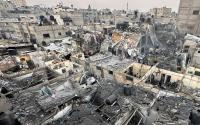Fernand Braudel Center, Binghamton UniversityList of previous commentaries in English and translations in other languagesCommentary No. 185, May 15, 2006
Walls are in the press again, and are controversial again - walls on the border between the United States and Mexico, walls to encircle Israeli settlements in the West Bank. These are walls that people in authority advocate building. But just about twenty years ago, Ronald Reagan stood at the Brandenburg Gate in Berlin and famously said, "Mr. Gorbachev, tear down this wall!"
Why do we build walls? Basically two reasons - to keep people out and to keep people in. Walls usually are built at the edge of one's jurisdiction - the jurisdiction of a governmental authority, the jurisdiction of private property. There are two questions we have to ask about walls. Are they moral? Are they effective? There is wide and deep disagreement on the answer to these two questions.
Let us start with the walls that are designed to keep people out. Why do we want to keep people out? The simple answer is that we have something that we think other people want and that we don't want to share with them. Since borders are merely lines on the ground, they are inherently porous. One solution is to build a wall that makes it difficult to cross the line - to enter the country or the property - and thereby to protect it from what we consider the illegitimate and illegal trespass/entry/seizure of what we consider that we own.
In the case of the wall the United States has been building along its border with Mexico, it is trying to make it more difficult for Mexicans and other Latin Americans to enter the United States without specific permission (a visa). And they of course are trying in most cases to enter in order to seek work or perhaps to achieve family reunion. The justification for the wall is that, were there not a system of visas, immigration into the wealthy country would be torrential and threaten the standard of living of the country into which people were immigrating. A system of visas limits the number (as well of course as choosing the types of persons who may enter), and the walls are there to prevent the outsiders from not passing through the sieve of the visas.
At the individual level, the equivalent is the creation of so-called gated communities, in which property owners in a locality create walls to keep out uninvited strangers, and hire private police forces to enforce this restriction. We call them gated communities in rich countries. But these days in large numbers of urban communities in the countries of the South, persons who live in wealthier houses erect individual walls to keep out intruders, walls that are often reinforced with barbed wire, fierce dogs, and sometimes private police. The justification is usually that the local governmental police force is inadequate to do the job of protecting attacks on persons and private property.
Now let's look at the other motive - to keep people in. When the German Democratic Republic erected the Berlin wall in 1961, the reason was political. There had been a steady exodus of persons to the Federal German Republic via the Berlin subway system. This was politically embarrassing to the authorities of the German Democratic Republic. So they built a wall, one that stayed in place until 1989. When Reagan called for the wall to be torn down, he was asserting the right of persons to emigrate, to leave where they were, for whatever reason.
That particular wall did come down. When it did, the persons behind the wall (figuratively all those who lived under Communist regimes in east-central Europe and the Soviet Union) found that they had acquired the right to emigrate, but not the right to immigrate. To immigrate, they still needed visas. And to this day, it is not at all easy to obtain these visas. So some of them legally emigrate but now illegally immigrate.
In the case of Israeli walls, the explanation offered is that they are being built to reduce the ability of Palestinians to engage in violent actions in these zones. But the walls are not being built at the edge of a jurisdiction. They are being built to create a jurisdiction, a way of creating de facto borders.
So, back to our two questions. Are walls moral? Are walls effective? The morality of walls constructed to keep people out comes down to the morality of property rights. And the morality of property rights is a question of how the property was acquired. The owners of the property claim it was the result of their hard labor, and others often argue that it was the result of theft, aggression, or other illegitimate (if not illegal) seizure. There is no generic answer to this question, and in practice the answer in particular cases is the result of political negotiations and political compromises.
Of course, one might think that persons committed to the endless virtues of the free market should feel that individual movement should be governed by the market and not by monopolies (restriction of rights of access through a system of visas, for example). But in practice, few advocates of the free market ever say this. They claim that goods and capital should move freely, but they tend not to extend this market principle to the movement of people.
And one might think that persons committed to social equalities ought to be in favor of sharing with everyone. But in practice, many advocates of social equalities, especially those in rich countries, wish to limit the social equalities to those already inside a particular country, and not open it to the entire world. The slogan seems to be protect our rights, property, and jobs, not the rights, property, and jobs of the entire world.
As for effectiveness, walls are effective in the short run to keep many (not all) people out, and to keep many (not all) people in. But in the middle run, walls are politically abrasive and magnify injustice, and therefore tend to force further negotiations. The one sure thing we can say about walls is that they are certainly neither friendly nor charitable nor a sign of freedom.






